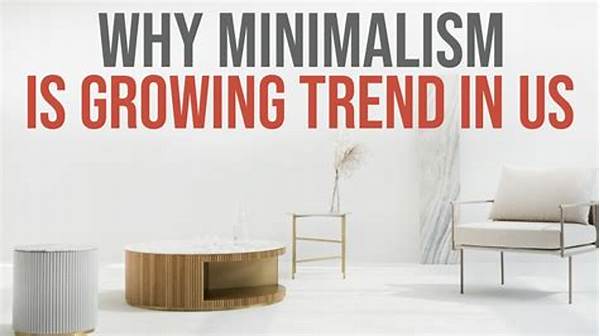Why Minimalism is a Growing Trend in Indonesia
In recent years, minimalism has increasingly become a popular lifestyle choice, making its way into the hearts and homes of many Indonesians. This growing trend isn’t just a fleeting fashion statement but a movement because of the desire for a more meaningful, less cluttered life. Indonesia, with its rich cultural heritage and crowded urban landscapes, sets a compelling backdrop for minimalism to thrive. As bustling cities like Jakarta continue to expand and the pressures of modern living increase, many are drawn to the concept of “less is more” — an embodiment of a life free from the shackles of material excess. Why minimalism is a growing trend in Indonesia can be attributed to several factors that range from economic to cultural and even psychological.
Read More : Best Minimalist Home Trends Loved By Millennials
In a culture where familial ties and community are pivotal, the shift towards minimalism might initially seem counterintuitive. However, this lifestyle emphasizes quality over quantity, making room for deeper connections and richer experiences. For the urban dweller facing never-ending traffic jams and sky-high living costs, minimalism offers a sanctuary, a mental and physical space where peace and purpose are prioritized. The movement is propelled not just by personal choice but also by an increasing awareness of environmental issues coupled with a growing digital influence through platforms that advocate for simpler living.
Minimalism allows individuals to disconnect from the overwhelming consumer-driven pressures and focus instead on personal growth, mindfulness, and sustainability. As more people in Indonesia embrace this lifestyle, they discover that minimalism doesn’t mean deprivation; rather, it’s about creating a life aligned with one’s values and aspirations. It’s about finding freedom in simplicity, and that’s why minimalism is a growing trend in Indonesia.
The Appeal of Minimalism in Urban Indonesia
The allure of minimalism in Indonesia is undeniable, especially in densely populated areas where living space is premium. For many Indonesians, the minimalist approach allows for a spacious and peaceful habitat, making homes feel more like havens amidst the chaos of urban life. It also presents practical benefits — by having fewer belongings, one can reduce clutter, making cleaning and organizing a more manageable task.
Dissecting the Reasons: Why Minimalism is a Growing Trend in Indonesia
The adoption of minimalism doesn’t happen in a vacuum. It’s a response to various pressures and desires that many Indonesians face daily. Why minimalism is a growing trend in Indonesia is a question best explored through a multifaceted lens, considering cultural, economic, and personal aspects that drive this change.
A deep dive into this phenomenon reveals that many urban Indonesians are overwhelmed by the constant inundation of advertisements and media promoting consumerism. This barrage prompts a reevaluation of priorities, steering people towards minimalism as a means to regain control over their lives. The trend finds a perfect harmony with traditional Indonesian values, which often emphasize community welfare and collective happiness over individual material success.
Social media also plays a critical role in elevating the status of minimalism. Influencers and thought leaders promote the aesthetic and mental benefits of decluttering and living simply, showcasing enviable lifestyles that many are eager to emulate. Through the lens of Instagram-ready homes and minimalist fashion, the narrative of “less is more” is both captivating and persuasive.
Cultural Influence and Environmental Awareness
Cultural traditions in Indonesia foster harmony and balance, principles at the heart of minimalism. The alignment of these values with an awareness of the global environmental crisis strengthens the call to adopt a minimalist lifestyle. As more attention is given to sustainable living, minimalism emerges not just as a personal choice but also as a moral imperative for the future.
Millennials and the Digital Age
The digital age accelerates the flow of information, making it easier for ideas like minimalism to spread rapidly. Millennials, often at the forefront of change, find in minimalism a way to navigate life more intentionally amidst the chaos of digital noise. They lead the charge in redefining success, not by the size of one’s wardrobe or home but by one’s ability to relish meaningful experiences and relationships.
In conclusion, the question of why minimalism is a growing trend in Indonesia can be attributed to a combination of cultural resonance, economic pragmatism, and a burgeoning awareness of environmental and personal well-being. Indonesia’s minimalist movement illustrates a transformation that’s both deeply personal and universally significant.
—
Action Steps for Embracing Minimalism in Indonesia
To embrace a minimalist lifestyle amidst Indonesia’s vibrant culture, consider implementing some practical steps that could help foster more simplicity and intentionality in one’s daily life:
The Minimalism Movement in Indonesia: A Closer Look
At its core, minimalism in Indonesia is about transformation — both internally and externally. Driven by young, tech-savvy individuals and permeating through various societal layers, this movement towards a pared-down lifestyle seeks to answer basic human conditions of happiness, autonomy, and ecological responsibility. The philosophy challenges societal norms of success and prompts a shift towards simpler, more sustainable living. A minimalist lifestyle not only benefits individual well-being but also contributes positively to the community and environment.
Understanding why minimalism is a growing trend in Indonesia requires a look at the socio-economic landscape and the ingrained value system. Many individuals are yearning for a narrative different from what conventional culture prescribes, one that prioritizes inner peace over external validation. This shift is not without its challenges, but as more Indonesians share their journeys and successes, a template for a minimalist lifestyle slowly takes shape, offering a compelling story of change and resilience.


